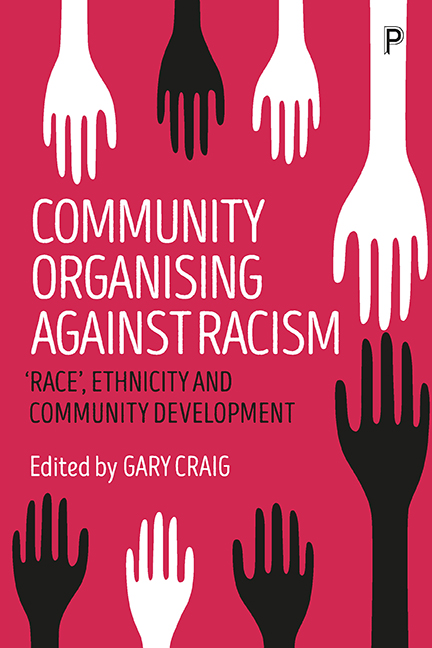Book contents
- Frontmatter
- Dedication
- Contents
- List of figures
- Author biographies
- List of abbreviations
- Introduction
- Section One Community development with ethnic minorities: history, theory, policy
- Section Two Building capacity with BME groups
- Section Three Working with Roma communities
- Section Four Global experience
- Section Five Working across cultural boundaries: ideological and personal reflections
- Afterword: Messages for community development in working with minority groups
- Index
Three - Capacity building with BME groups
Published online by Cambridge University Press: 12 April 2022
- Frontmatter
- Dedication
- Contents
- List of figures
- Author biographies
- List of abbreviations
- Introduction
- Section One Community development with ethnic minorities: history, theory, policy
- Section Two Building capacity with BME groups
- Section Three Working with Roma communities
- Section Four Global experience
- Section Five Working across cultural boundaries: ideological and personal reflections
- Afterword: Messages for community development in working with minority groups
- Index
Summary
Background
This chapter aims to examine community capacity-building processes in relation to the UK BME VCS, using a specific project in Birmingham, the UK's second-largest city, as its focus. The project, Birmingham Skills Training Reaching Organisations and Neighbourhood Groups (using the acronym B.STRONG), ran from 1998 to 2011 and was evaluated at regular intervals. B.STRONG covered the whole of Birmingham, although at certain times it prioritised certain areas of the city due to limited funding sources, and employed between two and eight staff. The account uses information available from these evaluations and the author's knowledge of the project, gleaned over what was an unusually long period.
Specifically, the chapter looks at the experiences of BME community groups in their engagement with community capacity-building processes and the wider ‘mainstream’ VCS. BME groups have been identified as being widely excluded from capacity-building programmes (Afridi, 2007 and Chapter One in this volume).
Community development staff within Birmingham City Council had identified the need for extra developmental support for community groups, along with the availability of European and area-based initiative funding. Consequently, B.STRONG was developed as a local authority project. This chapter examines the benefits and challenges of this approach.
It also looks at the current situation for community capacity building for the BME VCS in the longer term, given the current context of recession, government austerity measures and the reduction of funding possibilities. An analysis from the perspective of BME groups will be the subject of a future UK Third Sector Research Centre (TSRC) research paper. The term BME as used in this chapter includes people not born in the UK and second and third generations, and therefore includes white European migrants.
The project's period of operation coincided with an increase in the diversity and superdiversity (Phillimore, 2011) of the population of Birmingham and of other similar areas of England. Between 2001 and 2011, the population of Birmingham with an ethnic background other than White British (the core ‘host’ ethnic group) grew from 29.8% to 42.1% (Office of National Statistics [ONS] 2012). McCabe (2002) found that 65% of the project's users in the period 2000–02 were from a BME background. Goodwin (2006), in a later evaluation report on a government-funded regeneration project, found that over 90% of management committee members were from a BME background.
- Type
- Chapter
- Information
- Community Organising against Racism'Race', Ethnicity and Community Development, pp. 61 - 64Publisher: Bristol University PressPrint publication year: 2017

